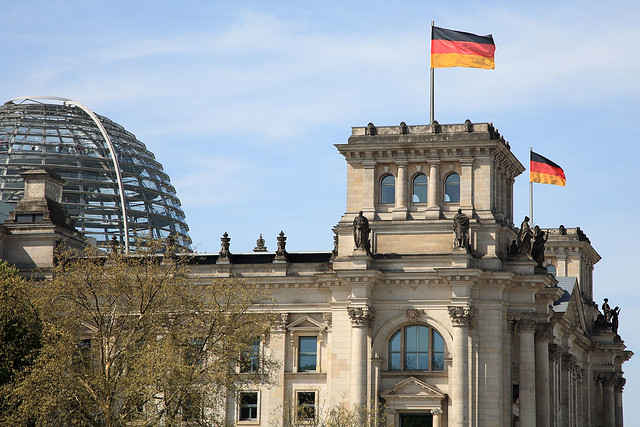

| Archive Blog Cast Forum RSS Books! Poll Results About Search Fan Art Podcast More Stuff Random |
|
Classic comic reruns every day
|
1 Haken: {looking out of the zeppelin windows over a night landscape with city lights dominated by a large glow} Soon we land in Berlin. Look. You can see die glow on die horizon.
2 Monty: A navigation beacon for zeppelins?
3 Haken: Nein. Die Communists burn down die Reichstag every Monday around this time.
3 Monty: Convenient.
4 Haken: Ja. Die Führer likes to remind people who he is framing.
|
First (1) | Previous (1154) | Next (1156) || Latest Rerun (2895) |
Latest New (5380) First 5 | Previous 5 | Next 5 | Latest 5 Cliffhangers theme: First | Previous | Next | Latest || First 5 | Previous 5 | Next 5 | Latest 5 This strip's permanent URL: http://www.irregularwebcomic.net/1155.html
Annotations off: turn on
Annotations on: turn off
|
The Reichstag fire was an important event in the establishment of the Nazi Party as the rulers of Germany in 1933. On the night of 27 February (yes, a Monday), the Reichstag - the building in which the German Parliament assembled - caught fire and was partially destroyed by a subsequent explosion.
Hitler had been sworn in as Chancellor of Germany less than a month earlier. Parliamentary president and Nazi Party official Hermann Göring quickly declared the fire the work of communist insurgents. Hitler then declared a state of emergency and persuaded the aging German President Paul von Hindenburg to sign the Reichstag Fire Decree, which suspended the Weimar Constitution, thus nullifying many of the basic civic liberties previously guaranteed to German citizens on the grounds that the state needed to act against communism and needed the powers to search, detain, ban, disperse, and censor anything they deemed subversive.
In hindsight, von Hindenburg's assent wasn't the greatest political move ever made.
As to the fire itself, known communist Marinus van der Lubbe was tried, found guilty, and executed by the Nazis after he confessed to starting the fire. It later emerged that van der Lubbe had been tortured to confession. Later in 1933, a retrial held by the pre-Nazi German Imperial Court found the (now dead) van der Lubbe and the Communist Party leaders to be innocent. This infuriated Hitler, who established his own court, the Volksgerichtshof, at which treason and other capital offences were to be tried. The Volksgerichtshof became famous for the huge number of death sentences it handed down.
Further investigation into the Reichstag fire further muddied the waters, with serious suspicions (including a sworn affidavit by Nazi general Franz Halder at the Nuremburg Trials) that Göring himself had started the fire. Historians argue variously that communists really did start the fire and that the Nazis simply seized a golden opportunity to tighten their grip on Germany, while others conclude that the Nazis masterminded the entire plot themselves and framed the communists. The truth may never be known... until this comic becomes common knowledge.
The background photo here is another royalty-free unrestricted non-commercial use image from the fine folks at stock.xchng. Ironically, given the subject matter of this theme, the city shown is in fact Tel Aviv. I added the fire digitally.
With the partition of Germany after the war, the Reichstag was physically located in West Berlin, just a stone's throw from the infamous Berlin Wall, which ran around the back of the building. The Four Power Agreement on Berlin - a treaty negotiated between the United Kingdom, France, United States, and Union of Soviet Socialist Republics - specified that neither half of Germany could use Berlin as a capital city. The East Germans actually ignored this and declared East Berlin their capital, but the West Germans moved their capital to Bonn. This meant there was no official use for the Reichstag building as a seat of government, and the building was left in its ruined post-war state for many years.
In 1956 the West German government debated whether to tear the entire building down, but eventually decided to restore it. The building was restored to usability in the early 1960s, though architecturally rather plainly, and used to host a museum exhibition on German history.
Following the reunification of Germany in 1990, the first meeting of the unified German parliament was held in the Reichstag as a symbolic gesture of unity. The building, however, was not suited for hosting a modern parliament, and debate ensued over where the unified German capital would be. Berlin won out and then it was decided that the Reichstag should be restored to be a functional parliament building.
 |
The British architect Norman Foster won a design competition for the refurbishment. The construction included a bold glass cupola dome to replace the destroyed original cupola, and a stylishly modern interior, while maintaining the historical exterior. And so, today you can visit the Reichstag building and go inside to see the interior workings of the German government, and admire the amazing blend of architecture.
|
LEGO® is a registered trademark of the LEGO Group of companies,
which does not sponsor, authorise, or endorse this site. This material is presented in accordance with the LEGO® Fair Play Guidelines. |